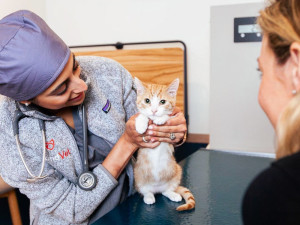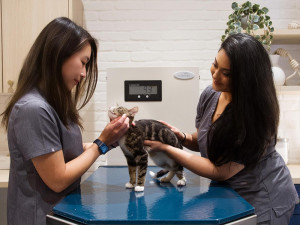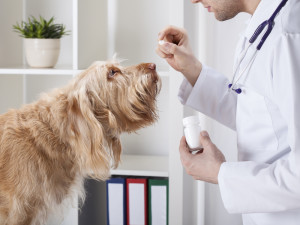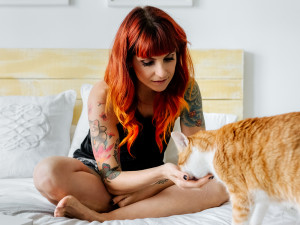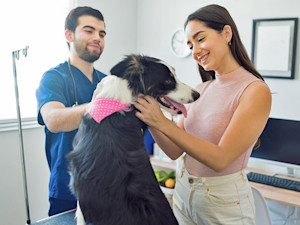Should You Get a Second Opinion If Your Vet Tells You Something You Don’t Like?
In the end, you know what’s best for your pet.
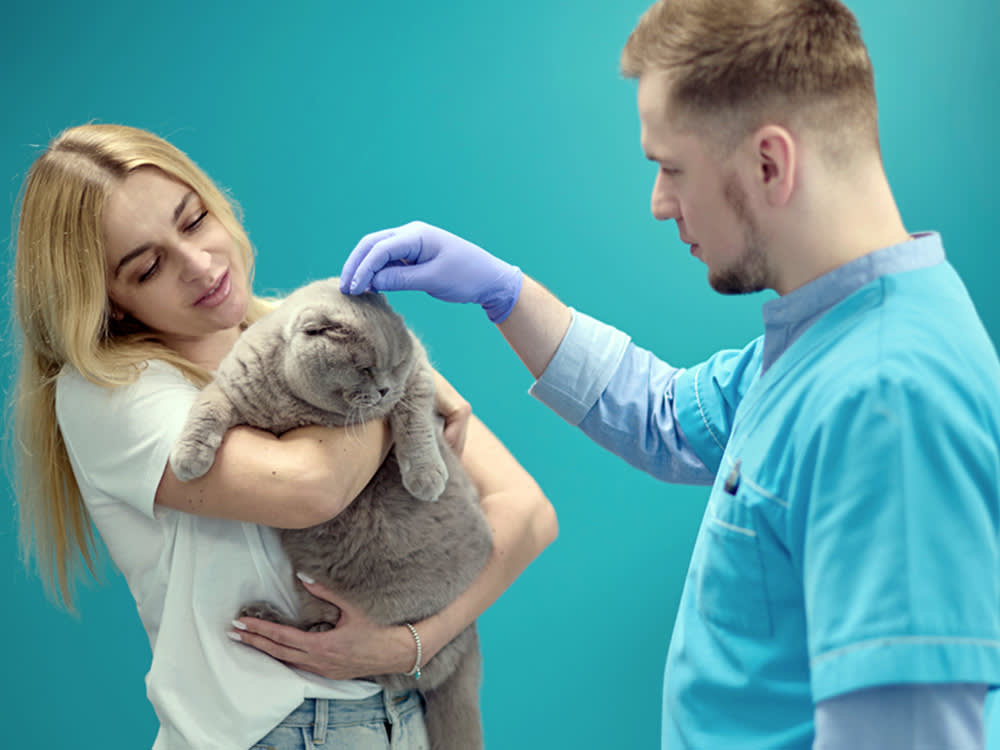
Share Article
I love my vet. She’s kind and communicative and always took wonderful care of the old, chronically ill cat I adopted during the pandemic. That cat, Pumpkin, was the kindest, gentlest, most loving cat I’ve ever had. I’m so glad I got to be his caretaker for the last few years of his life. But I didn’t know what I was signing up for when I adopted him. His chronic illness was only disclosed to me after I crossed state lines to pick him up, and even then, the rescue downplayed the severity of his condition. Two weeks after I brought him home, I was at a vet’s office nearby my apartment, paying $500 for a consultation. What’s more, I was told my cat would need a $12,000 surgery to remove both ear canals. I couldn’t believe it. I also couldn’t afford it.
I walked out of that appointment feeling like my only options were a surgery I couldn’t afford or a euthanasia I couldn’t justify. I cried, and I worried, and then I went out and got a second opinion.
Why it’s OK to seek another opinion
“It’s never wrong to seek a second opinion,” says veterinarian Dr. Lisa Cahnopens in new tab. “The one exception is in an emergency situation when seeking a second opinion could delay life-saving treatment.”
Pumpkin’s situation was urgent, but it wasn’t life-threatening.

I’m sure there will be people who read this who will say that I should have just trusted the first vet and spent whatever it cost to heal my cat, but that was not an option for me and even if it was, vets are not infallible. Just because one vet thinks you should address an issue a certain way, doesn’t mean that’s your only reasonable option.
“Just like human medicine, veterinary medicine is a complex field that is constantly changing,” Dr. Cahn says. “While some cases are cut and dry, others are more open to interpretation, which can vary based on when and where your vet went to school, and their personal interests and experiences. A vet’s ability to make a diagnosis [and implement a treatment plan] can also be limited by an owner’s financial constraints.”
That was certainly the case for me. It was simply not feasible to spend $12,000 on Pumpkin’s ear surgery. I didn’t have pet insuranceopens in new tab, nor could I get any. Pumpkin was 14 when I adopted him, and at the time no insurance company would sign on a new cat over 13 years old. And even if they had, his ear issues would not have been covered, because they would be considered a pre-existing condition.
When a second opinion is the best opinion
At the time, veterinary offices in New York were overburdened and understaffed, and I struggled to find a primary vet I could afford who was taking on new clients. I did find one eventually, via a referral from a friend who worked as a rescuer and foster, but the office was over an hour from my home by train. When I got there, because of COVID regulations, I had to drop Pumpkin at the door and then walk around the neighborhood for a couple of hours, waiting for the vet to call.
When she did, she told me that though surgery was certainly a good option, it wasn’t the only option. We discussed it, and she put Pumpkin on two different medications and those, paired with regular cleanings at home, kept him comfortable and his condition at bay for over a year and a half. During that time, he spent ever day curled up on my desk while I wrote and every night cuddling in my arms.
Pumpkin did die eventually, but all living things do. Could he have lived longer if he’d had the surgery? Maybe. But not necessarily. The more invasive and expensive option isn’t always the best option, especially if it is going to cripple you financially. If you find yourself wanting a second opinion — either because your pet’s treatment isn’t going as planned, or your vet doesn��’t have enough experience treating their particular issue, or simply because you’re looking for a less-invasive or more affordable treatment option — don’t be afraid to seek one out.
“Second opinions are very common,” Dr. Cahn says. “And your vet should not be offended by you wanting one as long as you approach them in a respectful way. Veterinarians choose this profession because we are passionate about animals and dedicated to their health and happiness. Just like you, we want the best for your pet, and sometimes that means collaborating with other vets or having a client go elsewhere.”
How to get the most out of talking to a second vet
Depending on what kind of pet insurance you have, visits to additional veterinarians for second or even third opinions could be completely covered, so consult your policy, if you have one.
Once you make your appointment, ask your previous veterinarian to send over all your pet’s medical records to the new office as soon as possible. “You will get the most out of your second opinion if the vet has a chance to review medical records before your appointment,” Dr. Cahn says. “This should include a timeline of symptoms, the results of any diagnostic tests, and what treatments have been tried so far. You can then ask if the new vet agrees with the assessment and treatment plan laid out by your previous vet and how they would recommend moving forward.”
She adds that pet parents should keep in mind that it’s still up to you to decide which veterinarian’s advice to follow — if either. And remember that you can return to your primary vet if you decide that is the best decision for you overall. Or you can keep exploring other options, like a specialist. Whatever you choose, as long as you approach your decision with care and compassion, it will be the right decision.

Charles Manning
Charles Manning is an actor and writer based in New York City. In his free time he likes to cook, go swimming at the public pool, volunteer at the LGBTQ senior center, and foster senior and special-needs cats. His work has previously appeared in Cosmopolitan, Elle, Marie Claire, Harper’s Bazaar, Seventeen, and Nylon.
Related articles
Is Your Pet Better Off With You In The Exam Room at the Vet or Not?
Veterinarians weigh in on whether you should accompany your pet in the exam room—or let them fly solo.
![Brown Labrador lifting front leg]()
How to Get a Head Start on Your Pet’s Health
Spot lumps, limps, and lethargy early on.
![A vet holding medicine near a dogs face]()
How to Find a Veterinary Specialist
Just like your doctor would refer to you a specialist for expert care for a complicated issue, your vet may do the same for your dog.
![Young modern woman with tattoos and orange hair sitting cross-legged on her bed with her cat]()
Does My Cat Really Need to See a Vet?
Cats can be hard to read. Especially when they’re sick. Or…not sick? We asked a veterinarian how to tell.
![Smiling woman happy at the animal clinic with the veterinarian.]()
How Much Does a Vet Visit Cost? Average Cost in 2026
Don’t get freaked out by the cost of pet parenthood—get prepared.

